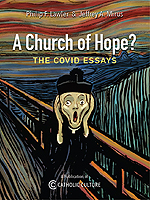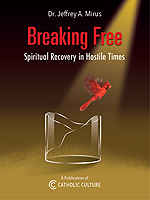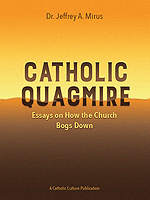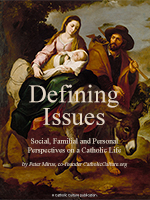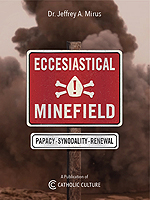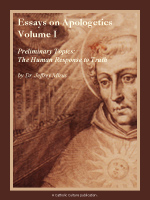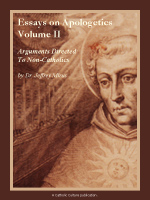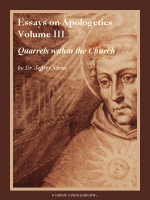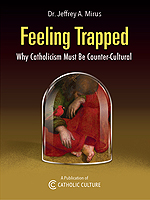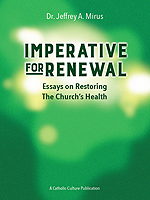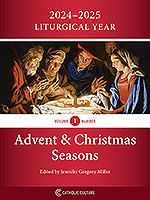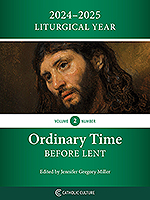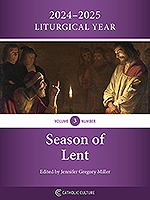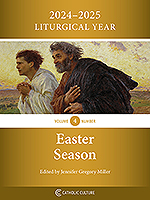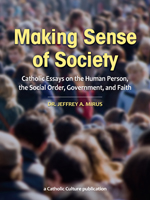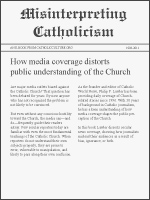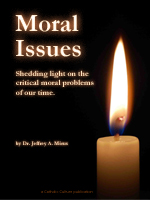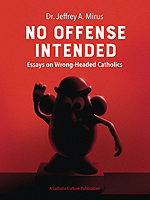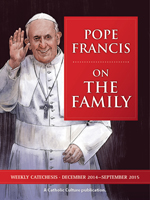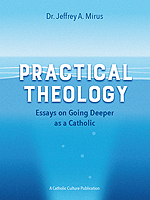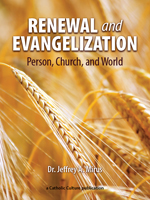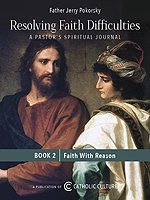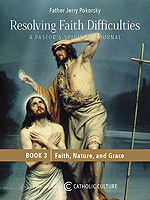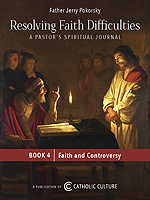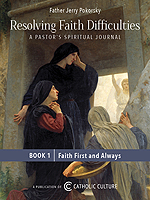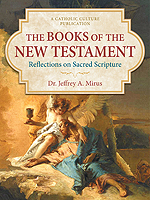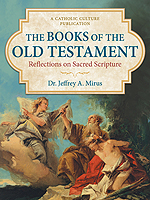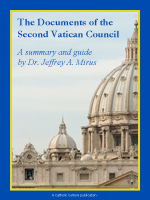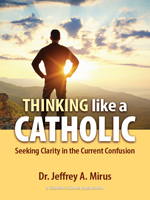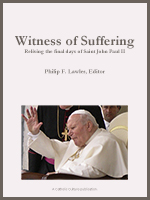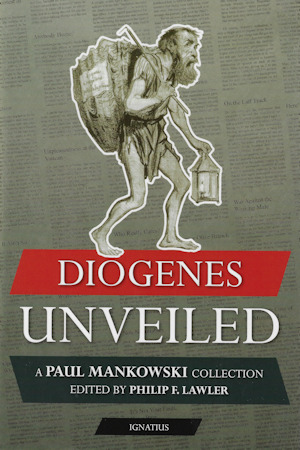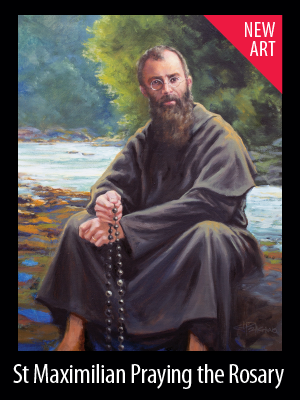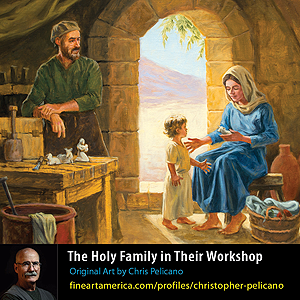Free Catholic eBooks from Our Authors
Featured
This fifth volume of the 2024-2025 Liturgical Year series covers the first half of the long stretch of Ordinary Time between Pentecost and Advent (the 9th through the 21st weeks, from June 9 – August 30), providing a rich set of resources for families to use in living the liturgical year in the domestic church. Resources include biographies of the saints to match each feast day, histories of the various celebrations and devotions, spirituality, descriptions of customs from around the world, prayers, activities and recipes.
Free eBook:

|
| Free eBook: Feeling Trapped |
All Titles
In these commentaries posted on CatholicCulture.org during the most intense periods of the COVID pandemic, Phil Lawler and Jeff Mirus provided an ongoing account and evaluation of how both the larger culture and the Catholic Church responded to COVID. Inescapably, then, they raised questions about how the larger culture and the Church should have responded. The situation was not simple. But it still revealed far too much.
A collection of essays written from March of 2019 to January of 2022 which focus on Catholic spiritual perception leading to personal spiritual growth, against the temptations to slackness which are rampant in a hostile culture and a weakened Church.
This collection of essays, written between early 2017 and early 2019, focuses on the many ways in which Catholics and their leaders tend to reflect the thought patterns of the surrounding secular culture. When this happens, they fail to address key contemporary issues as if their Faith makes a difference. Topics include mercy, purity, marriage, the family, common parental mistakes, the public authority of the Church, false priorities in Catholic leadership, sexual orientation, human respect, and more. When the Church is infected by worldly ways of thinking, she gets bogged down, rendering ineffectual the mission of Christ.
This is a collection of original essays for CatholicCulture.org written between 2004 and 2006. Topics reflect the author's interest in integrating issues and discussions raised by readers on the website into a cohesive vision of Catholic life. The range is impressive, addressing Catholic superheroes, Buddhism, Modernism, spam, parenting, arguing, the Chastisement, Tolkien, clergy and laity, Catholic social teaching, pornography, diplomacy, environmentalism and nearly a score of other topics—always from a fresh and invigorating Catholic perspective. With a sure touch, Peter Mirus discusses many of the subjects that concern today’s Catholics with the frankness and insight which made these essays so popular as they appeared. Peter Mirus is a marketing consultant and CEO of STA Tech Marketing. He holds a B.A. in English from Christendom College. Married with two children, Mirus is also a Director of the non-profit Trinity Communications and of its website, CatholicCulture.org.
Everybody wants personal renewal and every Catholic wants the renewal of the Catholic Church. But Church renewal is a minefield, in which God often writes straight with crooked lines—and we sometimes trigger explosions. These are essays written from March of 2019 though January of 2022 in which I explore how much care we must take with the papacy, the concept of synodality, and authentic Catholic renewal.
What initial territory needs to be cleared before we can effectively explain and defend our Faith? Dr. Jeff Mirus, who founded the apologetics program at Christendom College in addition to establishing Trinity Communications and CatholicCulture.org, explores that question in this first volume of his ongoing apologetical essays. This collection includes essays from 2004 to 2011 which focus on preliminary issues: The disposition of the apologist, impediments to Faith, problems with how our contemporaries approach reality and deal with truth, modern attitudes toward science, and even the way we think of the Church.
How we go about explaining and defending the Faith depends very much on our audience. This second volume of Dr. Jeff Mirus’ collected essays in apologetics includes essays written between 2004 and 2011 which primarily address those who are either not religious at all, not Christian, or at least not Catholic. These topics include natural theology, the argument from conscience, the nature of Revelation, the Resurrection of Christ, the role of the Bible, the primacy of Peter and the authority of the Church. This volume also includes the eleven-part “Why Be Catholic” series. The author holds his Ph.D. from Princeton University and has written frequently on apologetics over the past forty years.
How we go about explaining and defending the Faith depends very much on our audience. This third volume of Dr. Jeff Mirus’ collected essays in apologetics includes essays written between 2004 and 2012 which primarily address quarrels which too often divide Catholics from each other because of an inadequate grasp of the Faith. These topics include the nature of religious authority, Modernism, Traditionalism, Catholic social teaching, the Catholic approach to Scripture, and several other contemporary problems, plus a section of essays designed purely to enrich our understanding of the Faith. The author holds his Ph.D. from Princeton University and has written frequently on apologetics over the past forty years.
A collection of essays, written from March of 2019 through December of 2021, which highlight the impact of the dominant culture on both personal Catholic witness and the Church herself, emphasizing the need for a faith that is vibrantly counter-cultural if Catholicism is to make a difference, either to ourselves or to the rest of the world.
This collection of essays, written between early 2017 and early 2019, places the emphasis on what is necessary for a much-needed sustained renewal of the Catholic Church in our time. From clerical abuse to doctrinal murkiness to rampant accommodation with modern secularism, the Church today is weakened at every level from the papacy down to laypeople in (or out of) the pews. Jeffrey A. Mirus identifies the neuralgic points, and what we must do about them.
This first volume of the 2024-2025 Liturgical Year series covers all the days of Advent and Christmas, providing a rich set of resources for families to use in living the liturgical year in the domestic church, that is, in their own families. Resources include biographies of the saints to match each feast day, histories of the various celebrations and devotions, descriptions of customs from around the world, prayers, activities and recipes.
This second volume of the 2024-2025 Liturgical Year series covers all the days of Ordinary Time between Christmas and Lent, providing a rich set of resources for families to use in living the liturgical year in the domestic church, that is, in their own families. Resources include biographies of the saints to match each feast day, histories of the various celebrations and devotions, descriptions of customs from around the world, prayers, activities and recipes.
This third volume of the 2024-2024 Liturgical Year series covers all the days of Lent, providing a rich set of resources for families to use in living the liturgical year in the domestic church, that is, in their own families. Resources include biographies of the saints to match each feast day, histories of the various celebrations and devotions, descriptions of customs from around the world, and links to prayers, activities and recipes.
This fourth volume of the 2024-2025 Liturgical Year series covers all the days of Easter Season from the Easter Vigil through Pentecost Sunday, providing a rich set of resources for families to use in living the liturgical year in the domestic church, that is, in their own families. Resources include biographies of the saints to match each feast day, histories of the various celebrations and devotions, penitential spirituality, descriptions of customs from around the world, prayers, activities and recipes.
This fifth volume of the 2024-2025 Liturgical Year series covers the first half of the long stretch of Ordinary Time between Pentecost and Advent (the 9th through the 21st weeks, from June 9 – August 30), providing a rich set of resources for families to use in living the liturgical year in the domestic church. Resources include biographies of the saints to match each feast day, histories of the various celebrations and devotions, spirituality, descriptions of customs from around the world, prayers, activities and recipes.
Collected essays from 2007 through 2012 on such things as the purpose of government, including its size and scope; the interaction among culture, social life, politics and religion; the role of the Church in the social order; the relationship between what are commonly called the “life” issues and the “social” issues; the somewhat odd set of social prejudices which characterize the modern secular West; the threat of Statism; the principles of Catholic social teaching, such as subsidiarity, solidarity and the universal destination of goods; the role of natural law; and an analysis of complex specific issues such as immigration, pro-life strategy, and moral voting. Jeffrey A. Mirus is the founder of Trinity Communications and CatholicCulture.org, as well as a co-founder of Christendom College. He has been a Catholic apologist and commentator on Catholic affairs for over forty years.
Are major media outlets biased against the Catholic Church? That question has been debated for years. By now anyone who has not recognized the problem is not likely to be convinced. But even without any conscious hostility toward the Church, the media can—and do—frequently guide their readers astray. Few secular reporters today are familiar with even the most fundamental teachings of the Catholic Church. When reporters do not understand their own subjects properly, they are prone to error, vulnerable to manipulation, and likely to pass along their own confusion. As the founder and editor of Catholic World News, Philip F. Lawler has been providing daily coverage of Church-related stories since 1996. With 30 years of background in Catholic journalism, he has a keen understanding of how media coverage shapes the public perception of the Church. In this book he dissects secular news coverage, showing how journalists mislead their audiences as a result of bias, ignorance, or both.
The thirty-six essays collected here are the most compelling and enduringly useful of over one hundred moral essays by Dr. Jeffrey Mirus published on CatholicCulture.org between 2004 and 2011. In addition to four introductory and closing essays on moral theory and moral witness, they cover—in alphabetical order—such issues as abortion, animal rights, biomedical issues, capital punishment, contraception, environmentalism, health care, homosexuality, lying, marriage and gay marriage, the objectification of women and pornography, suicide and war. In these essays, Mirus sometimes establishes the simple right or wrong of a particular moral question, and at other times he explores important related issues, side effects and repercussions. The various issues cannot be separated completely, both because all moral issues are intrinsically related and because the predispositions, strengths and weaknesses of a particular culture cause that culture to deal with all moral issues in similar ways. Taken together, these essays open an important window on the moral landscape of the Western world in the twenty-first century after Christ.
This collection of essays, written between early 2017 and early 2019, includes the most strongly-worded commentaries by Dr. Jeffrey Mirus on the troubles created for the Church by wrong-headed Catholics, especially those in high places. But the author is as likely to set his sights on all of our shortcomings as he is to criticize Catholic leadership. Topics range from the frequent haplessness of the Catholic hierarchy to misunderstandings of the relationship between Church and State to the widespread confusion between Catholic teaching and our own national ideals.
December 2014 - September 2015 by Pope Francis
From December 2014 through September 2015, Pope Francis offered an extended catechesis on the family in 28 sessions. Topics include the Holy Family, mothers, fathers, children, siblings, grandparents and the elderly, male and female, the dignity of marriage, goodness in the family, education, engagement, unemployment and poverty, illness, death, woundedness, celebrating the family, work, prayer, transmission of the faith, the family and the Christian community, and the family as the bond of nations. An appendix adds two more catecheses given while the 2015 Synod was in session, and three more in the month following the Synod, bringing the total to 33.
A faulty understanding of Divine Revelation or Catholic teaching on faith and morals can interfere with our growth in love of God and neighbor and our response to the challenges we face. In this collection of essays written between late 2017 and early 2019, I have selected those which apply theological principles and insights to the way we understand the world and how we live. Topics range from Original Sin to human dignity, and include (among others) the difference between God’s law and mere ideals, the nature of authentic discernment, the character of holiness, the relationship between Church and State, the natural law, models of apologetics, temptation and moral gradualism, and even the incompatibility between trust in Providence and, well, complaining.
Over fifty essays originally published on CatholicCulture.org between 2005 and 2014 on the urgent need for a Catholic renewal, including the power of evangelization. These essays explore the necessary elements of personal holiness, ecclesiastical reform, and the leavening of the social order. Main topics include prayer, the liturgy and spiritual growth; ecclesiastical discipline and the strengthening of the Church's identity; evangelization and the formation of Catholic culture. Jeffrey A. Mirus is the founder of Trinity Communications and CatholicCulture.org, as well as a co-founder of Christendom College. He has been a Catholic apologist and commentator on Catholic affairs for over forty years.
In this very helpful collection of essays, Fr. Jerry Pokorsky addresses a great many of the problems and confusions in faith which have concerned Catholics over the centuries, and which seem especially widespread in the twenty-first century. This is the second volume of a series created from columns written in recent years for CatholicCulture.org. Its theme is Faith with Reason.
In this very helpful collection of essays, Fr. Jerry Pokorsky addresses a great many of the problems and confusions in faith which have concerned Catholics over the centuries, and which seem especially widespread in the twenty-first century. This is the third volume of a series created from columns written in recent years for CatholicCulture.org. Its theme is Faith, Nature, and Grace.
In this very helpful collection of essays, Fr. Jerry Pokorsky addresses a great many of the problems and confusions in faith which have concerned Catholics over the centuries, and which seem especially widespread in the twenty-first century. This is the fourth volume of a series created from columns written in recent years for CatholicCulture.org. Its theme is Faith and Controversy.
In this very helpful collection of essays, Fr. Jerry Pokorsky addresses a great many of the problems and confusions in faith which have concerned Catholics over the centuries, and which seem especially widespread in the twenty-first century. This is the first volume of a series created from columns written in recent years for CatholicCulture.org.
In this sequel to The Books of the Old Testament, Jeff Mirus continues his commentary on the books of the Bible to cover the writings of the New Testament. The project was completed between May of 2019 and July of 2020, beginning with St. Matthew’s Gospel and, of course, ending with the Book of Revelation. Once again, the goal is to offer basic insights into the nature of each New Testament book, so that readers may more easily grasp the purpose and meaning of these inspired texts.
In the Spring of 2017, the author began to reread the Old Testament in order to note down the particular insights about each book which occurred to him as he entered the fullness of what Scripture calls man’s three score and ten. As the project continued, he began to write up his reflections and post them on CatholicCulture.org. The response being favorable, this grew into the project of commenting briefly on each book of the Bible. Two years later, the Old Testament has been completed, and there has been enough positive feedback to make the collected essays available as an ebook—offered in the hope that others too will find additional insights into God’s ways with the sons and daughters He so dearly loves.
A collected series of 34 articles written on the documents of Vatican II between February and October of 2010. From the Introduction: "This is a series of commentaries on the individual documents of Vatican II, in which I intend to focus very briefly on their key ideas, illustrating their depth and beauty through select quotes, and highlighting the concepts that have become controversial, especially in light of the peculiar thing that happened to them between their approval by Pope Paul VI and their implementation. They were implemented, of course, by All the Usual Suspects—that is, by the nominally Catholic theologians, bishops, priests and sisters who abandoned the Faith without leaving the Church in the heady days of late 20th century secularization, and who have used their power to take as many unfortunate souls with them as possible. Now is an excellent time to review the documents precisely because the tenure of All the Usual Suspects in the halls of Catholic influence is finally nearing an end as ignominious as it was slow in coming."
A collection of essays written between 2021 and 2025 covering the Synod process, Catholic teaching and American politics, the just war tradition, Pope Francis and the war on Tradition, The Vatican and the universal Church, and When things go wrong.
Whether writing about the nature of human knowledge or the absurdity of gender ideology, Jeff Mirus makes a point of not just reaching sound conclusions but also demonstrating the key principles which must be deployed to think clearly about the issues which so confuse modern culture. Other topics include relativism, evangelization, mercy, and what it takes to develop a truly vibrant Catholicism. Dr. Mirus shows how Catholics can address these problems, dispelling the intellectual confusion and moral chaos which affects even so many within the Church. This collection of 47 essays, written between 2014 and 2017, does more than showcase the arguments we so obviously need. Taken as a whole, it becomes a superb tutorial in Thinking like a Catholic.
Faced with a debilitating disease, Saint John Paul II chose not to suffer in privacy, but to let the entire world watch his struggle. Inevitably he would lose the fight against his illness. But in the process he would offer a personal testimony to the value of suffering. The last weeks of his life became a powerful drama, reaching its emotional climax as the world stood vigil—somber, prayerful, expectant—during his last hours. This collection of headline stories, from the weeks leading up to his death, recaptures the drama and offers readers another opportunity to reflect on the beloved Pontiff’s final gift to the Church: his suffering.



